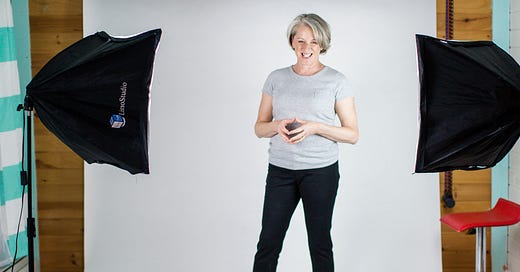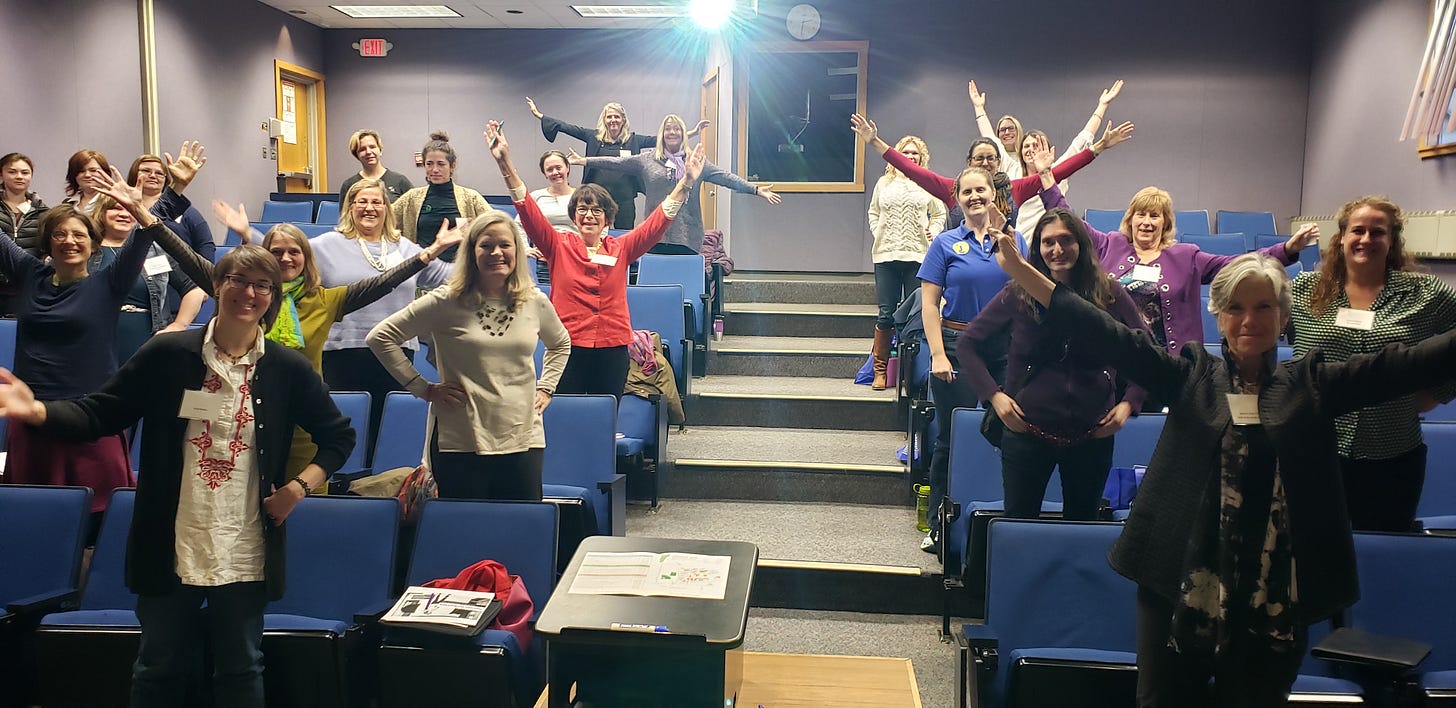The promise of authenticity
How to be authentic, according to me and a roundup of 5 genuine Substack writers
Before we get to the essay, I have some exciting news! I re-launched my Substack in late September; since then, subscriptions have increased by 40%. (ahem-
IYKYK)I am so grateful for everyone’s support in these early days of Midlife Anti-Hero.
Authentic is the word of the year, but what does it mean?
Meriam Webster declared authentic to be the ‘2023 Word of the Year.' It's been my chart-topper for much longer—following perfectionism, persistence, purpose, and hyaluronic.
The online dictionary definition reads, in part:
1: not false or imitation; REAL, ACTUAL
2: true to one's own personality, spirit, or character
3: a worthy of acceptance or belief as conforming to or based on fact
In October 2019, I stood before a half-filled auditorium, feet planted firmly, hands on hips. "So much of a personal brand is how we show up in the world," I said as the women in the audience settled handbags and jackets. “A brand is a promise. It tells a story and gives people a reason to believe. Your brand is an authentic reflection of who you are.”
"Speak up!" A voice called from the back of the room.
Who was I to lecture these women entrepreneurs and business owners on the importance of building a credible brand? Who was I at all?
Before reinventing myself as a writer, I spent decades in corporate marketing. I created sales pitches for products and clickable content espousing the company's vision. However, it was near the end of my tenure when my creative writing skills proved most valuable. As I filled out my annual development plans, every professional goal and ambitious objective I wrote was either fiction or fantasy.
My career persona met Webster's definition of authentic: "worthy of acceptance or belief as conforming to or based on fact." In other words, it was cool as long as the lies I told my managers—and myself!—were based on what we both believed should be true.
This form of fluid authenticity comes in handy, especially when the stakes are higher than mine will ever be. Because, as
writes in Culturally Enough, "Authenticity is usually only encouraged as long as it doesn't make others uncomfortable.”Don’t assume that you are the same person in every situation.
—Sahaj Kaur Kohli, Stop Telling Me to Be Authentic
Entering the arena
It was ten months since leaving my career that I stood behind that lecture podium, perpetuating the narrative of my ambitious professional persona for a new audience.
I stumbled onto the 2019 Vermont Women's Economic Opportunity Conference agenda. I told the organizers I'd like to volunteer, thinking of handing out name tags, and they asked if I would lead a workshop.
Although I was committed to becoming a writer, a mote of "what if" still hung like dust in a ray of sunshine. I didn't desire to be center stage, but I still thought I should want to be the kind of person who did.
Shouldn't I want to be "in the arena?" Having watched Brené Brown's Netflix special, I felt a renewed pressure to "dare greatly." It took years to understand that she’d meant having the “courage to be vulnerable.” At the time, I was focused on what and where I assumed other people thought I should be.
I tackled the presentation prep from a crooked-ceiling second-floor room that served as my home office in Vermont just as intensely as I would have in my former over-air-conditioned, grey-carpeted cubicle. I titled the presentation "A Star is Born! Personalizing Your Brand Story" and animated the PowerPoint slides.
I made handouts and ordered business cards with my photograph and website address. I added a red thread image across the front and back of the card to symbolize the single line of truth that connects our story, no matter where or how we tell it.
It felt easy to get back into the marketing groove. But when I tried to find my red thread while writing a personal essay for my first MFA workshop, my fingers stalled on the keyboard. Every word felt forced and phony. Is this my authentic voice? Is this what they want to hear?
If you wish to be a writer, a for-real writer, then you're going to need risk, provocation, transgression—in other words you're going to need play to make it.
Even if you ain't aiming to be a "serious" writer you'll need play to write your best. And play, without risk, provocation, transgression, is not play – it's bullshit.
—
How to Stop Worrying about Authenticity
I questioned my work constantly. (Still do). Is this how I feel? Is it all bullshit? I write personal essays and opinion pieces, and I'm working on a memoir. Being truthful in style and substance is a job requirement. Note to self: Add "play" to the list.
Is it possible to be authentic online?
"You are your brand," I said to the workshop attendees, spreading my arms wide. I'd asked them to stand and try their best power poses. "To be the star of your story, you need to take up space and get out of your comfort zone." Little did they know, I was hiding my nervousness behind this professional persona and business wardrobe I wore like Kevlar.
I spoke confidently about defining a target audience, developing messages, and strategies to engage with potential customers—topics about which I had knowledge and experience. The gold-star seeker in me whispered You should do this! Open a marketing agency! Become a consultant! A coach! You love public speaking!
Things were going well until I clicked on the Instagram slide. Papers rustled as the women shifted forward in their seats. Oh my God, this is why they are here! The actual reality of my 132 followers struck me like a bell.
For many small businesses who can't afford advertising or websites, social media is their only means of reaching customers. Yet, I knew little about the ins and outs of algorithms, hashtags, and video-making necessary to increase visibility on these platforms. I'd prepared exercises on how to write their personal stories, but it was clear, based on their questions, that they wanted something more quantifiable: more followers.
I tossed out tidbits from articles I’d read about growing an online audience and emphasized this point.
The number of followers you have does not matter if they do not believe you are authentic.
"Louder, please." That same faceless voice.
Why should they believe you? One minute, I was clear and confident, and in the next—I'd lost my hold on the red thread. I could almost feel bits of myself fraying in the palm of my hand.
If only I’d known
"What is taken to be authentic is continually changing," writes
in Meets Most. "In the age of social media, it's changing at lightning speed."Her take is so close to my truth it's scary.
So much is a constant performance, with so little chance to take a break from performing, especially as people spend more time online and report being more isolated and having fewer friends and in-person social interactions. No wonder we're all so exhausted!
—Leah Reich, Authenticity is a Construct
In agreeing to lead the workshop, I had strayed too far from my true personality and lost the spirit I'd been working so hard to resurrect in midlife. Perhaps in judging authenticity based on what others believe about us, we stay true to Webster's definition, but before the workshop was over, I knew I wasn't being true to myself.
To quote Brené Brown again, I had traded my "authenticity for the approval of others." Of course, I had. I'd been doing it for years. It was time to shift.
Ignore the expectations of others and honor the intentions of your creative vision.
—The Creative Shift by Dan Blank,Share with Authenticity and Intention
Authenticity is the process of self-discovery
On the page, when I wrestle with my feeeeelings (oh, how this amateur memoirist hates that word), the work—the very hard work—is to discover what is true to me. The final product is for others to authenticate. Have I conformed to their version of the facts? Do I care?
It's the process of writing that is most authentic to me. When I peel the skin back and expose muscle, bones, and organs to examination, that's where the truth lies! But, before I show it to you, I will have stitched the wounds closed.
When the workshop was over, the women applauded, smiling and complimentary. I ducked into a bathroom to rifle through their feedback forms, and my skin flushed with equal parts adrenaline and relief.
"Thank you for your authenticity!"
"Appreciate that you were so authentic about your story."
They'd judged me as real and deemed me worthy!
asserts in his newsletter From The Desk, that authenticity isn't ours to determine. "Only others can judge whether we're authentic," he writes."When we praise someone for being authentic, we're congratulating them on behaving in a way that conforms to our conception of them. We package up everything we know—where they grew up, their age, their income level, their friends; really, a dozen little micro judgments—and use that to determine whether they present themselves consistently with their environment and past."
—Miles Farnsworth, Rethinking Authenticity
The women at the workshop knew nothing about me. They believed what they saw in the moment. But did I?
Later that night, I posted a workshop photo on Instagram. I thought it wouldn't hurt to burnish my brand with a picture from inside the "arena." Then, it hit me as though I were a boxer on the ropes. I wasn't following my advice—it doesn't matter how many followers you have as long as you're authentic.
Or, had I said, as long as people believe you are authentic?
I left my marketing career because it no longer felt authentic to who I was or wanted to become. This workshop experience was no different than the work I used to do. I created a persona that would appeal to a target audience—an image I no longer wanted to reflect.
When I tried to conform to someone else's ideas on what or who I should be, I knew that I was weakening the red thread—twisting and knotting my authentic self. However, it wasn’t until I led the workshop that I realized, I had to create many versions of who I thought I was supposed to be before I could discover who I truly am.
When I write, every blank page or blinking cursor demands, Who are you? What do you have to offer? Why should anyone believe you? No number of power poses or color palettes can answer those questions.
I begin to write. Every word that follows is a promise.





Knowing who we are is a journey; it only follows that acting with more authenticity must be one too. They go hand in hand. But how to know more of who we are, and then how to act in keeping with more of who we are? These, I think, are the key questions; and an active authenticity, I believe, the answer. Thanks for posting an interesting article.
I have often had these same thoughts, and actually still do, questioning am I my real me or just being who everyone has always told me I am? So many labels get assigned to us, pretty, jock, smart, shy, lazy, etc. Whatever those labels are, said enough times you believe they are who you are. It is hard to separate what is truly the authentic you. An ongoing search for sure.